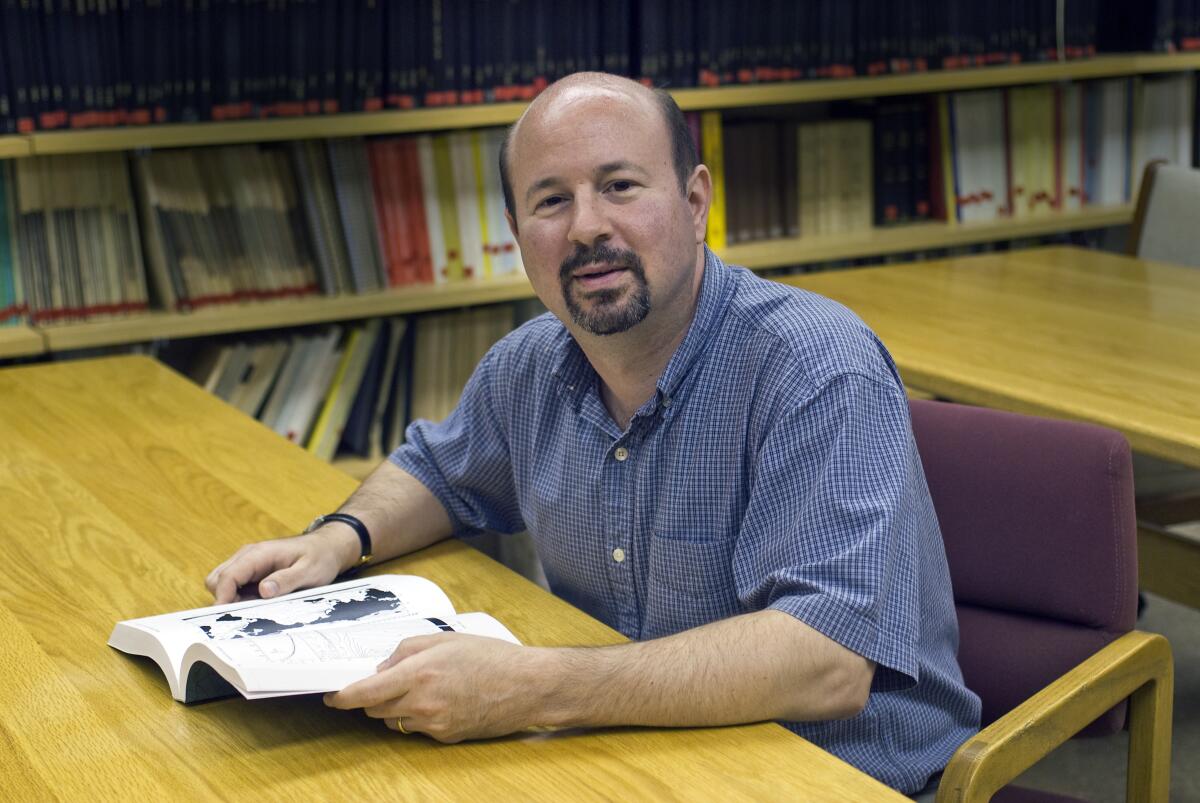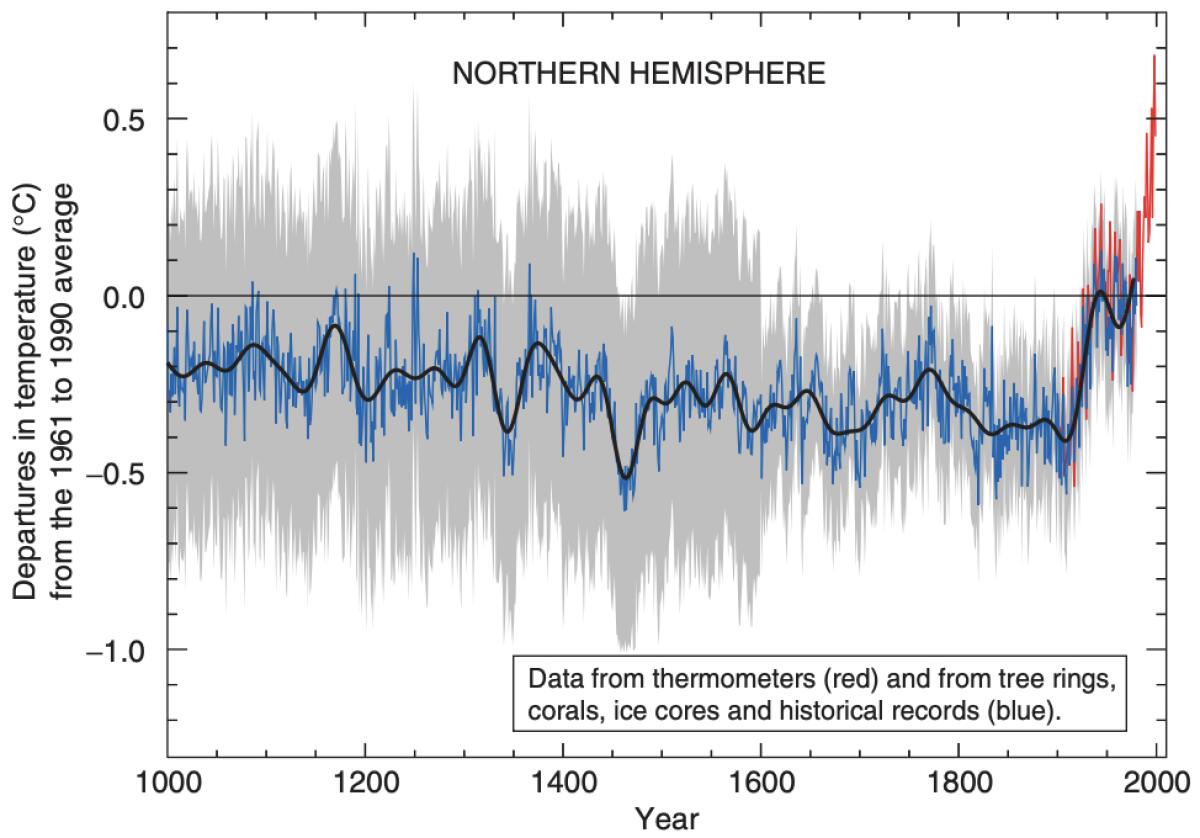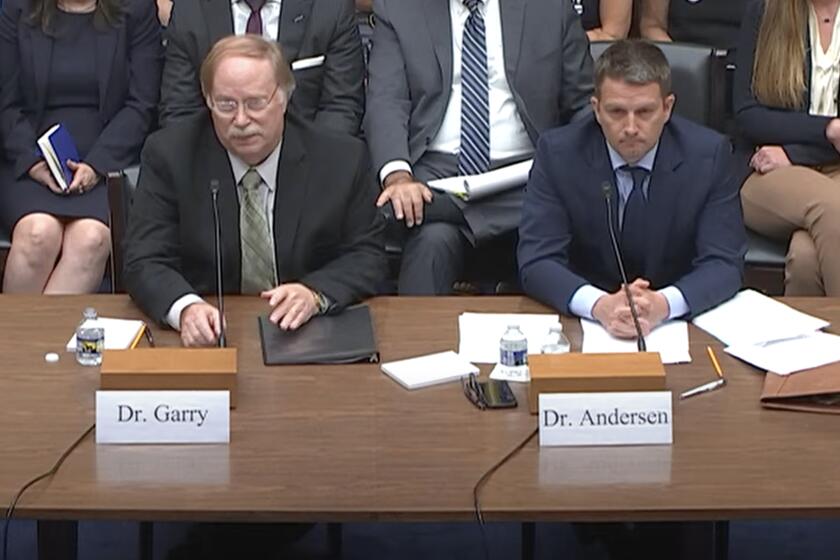Column: The climate scientist who just won a $1-million judgment against climate change deniers

- Share via
One of the major issues confronting scientists today — especially those working in the heavily politicized fields of global warming, vaccines and the origin of COVID-19 — is how to deal with the torrents of misinformation and disinformation, some of it personal, pushing back against their work.
Climate scientist Michael E. Mann just found an answer. Sue the critics — and win.
Last week, a Washington, D.C., jury awarded Mann more than $1 million in punitive damages against two right-wing writers who had accused him of research fraud.
I hope this verdict sends a message that falsely attacking climate scientists is not protected speech.
— Climate scientist Michael Mann
The jurors didn’t appear to find this a close question. They ruled that the online posts written by Rand Simberg and Mark Steyn breached the legal standards applied to defamation lawsuits involving a public figure such as Mann — that their writings asserted facts that were “provably false” and that they knew or should have known that their assertions were false.
The jury awarded Mann $1 in compensatory damages from each defendant, plus $1,000 in punitive damages from Simberg and $1 million in punitive damages from Steyn. The verdicts capped a painful 12-year battle that Mann waged to protect his reputation from trolls questioning his integrity.
Get the latest from Michael Hiltzik
Commentary on economics and more from a Pulitzer Prize winner.
You may occasionally receive promotional content from the Los Angeles Times.
“I hope this verdict sends a message that falsely attacking climate scientists is not protected speech,” Mann said after the verdict.
There’s more to the case than the exoneration of a single scientist. The verdict scored a direct hit on personal attacks on scientists using innuendo and outright lies, all aimed at advancing partisan and economic ideologies by undermining scientific research.
“The attacks denigrating science and trying to undercut science, both for climate science and biomedicine, [are] not just about the science,” Peter Hotez, a leading authority on medicines and vaccines and a prominent foe of anti-science politics, told PBS.
“It’s now gone the next step to attack the scientists and portray us as public enemies,” said Hotez, who is collaborating with Mann on a book about the anti-science movement. “Both Michael and I are stalked regularly. We receive threats online, phone calls to the office, sometimes physical confrontations. So it’s gone out to that new level.”
Florida Surgeon Gen. Dr. Joseph A. Ladapo is advising people to avoid the most effective COVID vaccines, just as a surge in disease cases gets worse.
Scientists working in all fields subjected to partisan critiques have lamented that the flow of lies about their work and about established science can be unrelenting.
The critics are financed by right-wing foundations and their claims repeated at congressional hearings — typically, these days, chaired by House Republicans aiming to pump conspiracy theories into the mainstream. Sometimes, as many targets have experienced, the criticism degenerates into personal threats and physical confrontations.
Much is at stake in these battles. Global warming is an elemental threat to life on Earth, and ignoring it as its deniers advocate is a recipe for extinction. Campaigns by anti-vaccine activists can cause sickness and death for untold millions in the U.S. and worldwide.
To understand Mann’s case, it helps to start at the beginning.
In 1998 and 1999, Mann and colleagues published two papers reporting that global temperatures, which had been stable for at least a millennium, began rising sharply during the 20th century and especially in the last 50 years. They used evidence from tree rings, sediment cores from oceans, caves and lakes and ice cores from glaciers to reconstruct climate patterns of the distant past.

The 1999 paper illustrated their findings with what became known as the “hockey stick” graph because it resembled that implement with a long horizontal shaft (the distant past) ending with a nearly upright blade (recent times).
Mann’s research and the graph drew immediate pushback from global warming deniers, who questioned his data and methodology. After 2009, when emails among climate scientists including Mann were hacked from the files of the University of East Anglia in Britain and cherry-picked to suggest that the scientists were manipulating their data, they also questioned his integrity.
The attacks on Mann should have been ended by a series of official investigations through 2021 that cleared him of research wrongdoing, including two by Pennsylvania State University, where Mann taught from 2005 to 2022, and another by the National Science Foundation.
In all, eight separate investigations by official bodies found Mann innocent of wrongdoing or validated his research findings; the results all were made public. But the attacks continued, even up to this day. (Mann is now at the University of Pennsylvania.)
Measles cases are surging in Europe and Central Asia, according to the World Health Organization. Who’s responsible? The anti-vaccination movement and its leaders, such as Robert F. Kennedy Jr.
That brings us to the noxious posts by Simberg and Steyn.
Simberg’s post, titled “The Other Scandal in Unhappy Valley,” was published by the Competitive Enterprise Institute on July 12, 2012 — after Mann had been cleared. It’s worth noting that the CEI is a free-enterprise think tank that has been funded by the Koch network, other far-right moneybags and the tobacco industry, and that global warming denial has been one of its favorite themes.
Simberg drew a connection between the scandal in the Penn State football program involving a cover-up of sexual molestations by Jerry Sandusky, an assistant coach, and the university’s purported “whitewash” of Mann’s hockey stick deceptions. (The headline referred to the nickname of Penn State’s scenic location, “Happy Valley.”)
“Mann could be said to be the Jerry Sandusky of climate science,” Simberg wrote, “except for instead of molesting children, he has molested and tortured data in the service of politicized science.”
CEI has left Simberg’s post up on its website but has excised his references to Sandusky as “inappropriate.” However, the full post, including its original references to Sandusky, was reprinted in a 2016 decision by a Washington, D.C., court of appeals that allowed Mann’s case against the writers to proceed to trial.
Steyn followed Simberg’s post with his own, published in the conservative organ National Review on July 15.
While writing, apropos of Simberg’s Sandusky reference, that he was “not sure I’d have extended that metaphor all the way into the locker-room showers,” Steyn asserted that Simberg “has a point.” He called Mann’s hockey-stick graph “fraudulent.”
Steyn and Simberg both questioned the investigations that cleared Mann. Simberg noted that Penn State’s investigators were all tenured professors on its faculty. Steyn wrote, “If an institution is prepared to cover up systemic statutory rape of minors, what won’t it cover up?”
Simberg also referred disdainfully to a 2011 investigation by the National Science Foundation’s inspector general, which exonerated Mann, writing that it relied on information from Penn State and therefore was “not truly independent.”
The anti-vaccination and anti-science movements are killing thousands of innocent people. Why don’t government agencies and professional groups speak up?
A couple of points about that. First, Simberg wrote that the investigation was by the National Academy of Sciences, which is different from the NSF. (The NAS conducted its own investigation upholding Mann’s work, in 2006, but that’s not the one Simberg quoted.)
Second, the NSF’s office of inspector general specifically stated that in its investigation it did not rely on Penn State.
Rather, it examined “a substantial amount of publically [sic] available documentation concerning both [Mann’s] research and parallel research conducted by his collaborators and other scientists” in the field of global warming, and also interviewed Mann, “critics, and disciplinary experts” before finding that there was no evidence that Mann “falsified or fabricated any data.”
National Review defended itself and Steyn’s column with the sort of vacuous braggadocio that is its stock in trade.
In a 2012 editorial headlined “Get Lost,” its editor, Rich Lowry, laughed off Mann’s threat to file a lawsuit by pledging that if Mann did so it would be pleased to engage in “extremely wide-ranging” discovery — “we will be doing more than fighting a nuisance lawsuit; we will be embarking on a journalistic project of great interest to us and our readers.”
In the event, National Review turned tail and ran. It persuaded the D.C. court to drop it from Mann’s lawsuit in 2021 by pleading that Steyn wasn’t its employee but merely an “independent contractor” and that none of its employees had reviewed his posting until it was published on its website, which it portrayed as sort of a neutral landing place for posts to appear. That “journalistic project of great interest”? Fugeddaboutit.
The Competitive Enterprise Institute also got itself dismissed from Mann’s lawsuit in 2021 via a similar argument that a judge described as “an assertion of ignorance”: It said Simberg wasn’t its employee and that the low-level employee who did review his article before it posted checked it only for “formatting error and typos,” not for content.
House Republicans used an oversight hearing to accuse former NIH officials Anthony Fauci and Francis Collins of complicity in the COVID pandemic. The loser in this cabaret is science.
National Review continued to ridicule Mann. In January, as the trial against the writers began in a D.C. courtroom, it labeled Mann “a darling of fashionable opinion,” placed his case in the category of “runaway snowflakery” and called it “laughably weak.” (Whoops.) Given the publication’s court-ordered immunization against liability, it appeared to be taking on the role of a bully who goads others into waging battle with the words, “Let’s you and him fight.”
Now that the verdict is in, National Review is wrapping itself in the U.S. Constitution. It editorialized that a few blocks from the courthouse, “at the National Archives Museum, the 1st Amendment faded a little on its parchment.”
It asserted that Mann won the $1-million verdict merely for a blog post that did no more than “ruffle [his] feathers.” It charged that Mann’s “mendacity and egomania” motivated his lawsuit.
“Ultimately, this lawsuit is not about Mark Steyn or about conservative magazines or about climate change,” National Review wrote, “but about the integrity of free speech in these United States.”
The truth is, however, that Steyn and Simberg lost only after the jury applied the most stringent standards for defamation lawsuits — standards that have been developed precisely to protect “the integrity of free speech” and that protect serious journalism. Mann had to show that the authors knew or should have known that their factual assertions about his work were false, and that’s exactly what he did.
The lesson embodied in the jury award is not that you can’t smear or defame your targets. The jury didn’t rule that you can’t express an opinion about them or their work in the course of robust debate.
What it did rule, and it isn’t alone in honoring this principle, is that you can’t smear them by parading lies and misrepresentations as though they’re facts — not without paying a price.
That may be a frightful lesson for National Review and other publications like it, but it should be comforting for the rest of us.
More to Read
Get the latest from Michael Hiltzik
Commentary on economics and more from a Pulitzer Prize winner.
You may occasionally receive promotional content from the Los Angeles Times.















